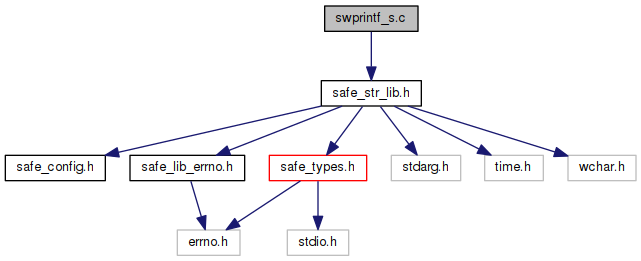swprintf_s.c File Reference
#include "safe_str_lib.h" Include dependency graph for swprintf_s.c:
Include dependency graph for swprintf_s.c:Functions | |
| EXPORT int | swprintf_s (wchar_t *restrict dest, rsize_t dmax, const wchar_t *restrict fmt,...) |
The swprintf_s function composes a wide string with same test that would be printed if format was used on wprintf. More... | |
Function Documentation
◆ swprintf_s()
| EXPORT int swprintf_s | ( | wchar_t *restrict | dest, |
| rsize_t | dmax, | ||
| const wchar_t *restrict | fmt, | ||
| ... | |||
| ) |
The swprintf_s function composes a wide string with same test that would be printed if format was used on wprintf.
Instead of being printed, the content is stored in dest. With SAFECLIB_STR_NULL_SLACK defined all elements following the terminating null character (if any) written by swprintf_s in the array of dmax wide characters pointed to by dest are nulled when swprintf_s returns.
- Note
- POSIX specifies that
errnois set on error. However, the safeclib extendedES*errors do not seterrno, only when the underlying systemvswprintfcall fails,errnois set.
- Remarks
- SPECIFIED IN
- C11 standard (ISO/IEC 9899:2011): K.3.9.1.4 The swprintf_s function (p: 630-631) http://en.cppreference.com/w/c/io/fwprintf
- Parameters
-
[out] dest pointer to wide string that will be written into. [in] dmax restricted maximum length of dest [in] fmt format-control wide string. [in] ... optional arguments
- Precondition
- Neither
destnorfmtshall be a null pointer. -
dmaxshall not be greater thanRSIZE_MAX_WSTR. -
dmaxshall not equal zero. -
dmaxshall be greater thanwcsnlen_s(dest, dmax). -
fmtshall not contain the conversion specifiern -
None of the arguments corresponding to
sis a null pointer. (not yet) - No encoding error shall occur.
- Note
- C11 uses RSIZE_MAX, not RSIZE_MAX_WSTR.
-
While narrow strings provide
snprintf, which makes it possible to determine the required output buffer size, there is no equivalent for wide strings (until C11'sswprintf_s), and in order to determine the buffer size, the program may need to callswprintf, check the result value, and reallocate a larger buffer, trying again until successful.
- Returns
- If no runtime-constraint violation occurred, the swprintf_s function returns the number of wide characters written in the array, not counting the terminating null wide character. If an encoding error occurred or if n or more wide characters are requested to be written, swprintf_s returns a negative value. If any other runtime-constraint violation occurred, swprintf_s returns zero, and sets errno.
-
If the buffer
destis too small for the formatted text, including the terminating null, then the buffer is set to an empty string by placing a null wide character atdest[0], and the invalid parameter handler is invoked.
errno: ESNULLP when dest/fmt is NULL pointer ESZEROL when dmax = 0 ESLEMAX when dmax > RSIZE_MAX_WSTR ESNOSPC when return value exceeds dmax EINVAL when fmt contains n
- Return values
-
-1 if an encoding error occurred or if n or more wide characters are requested to be written. 0 on some other error
- See also
- vswprintf_s(), snwprintf_s(), vsnprintf_s()
